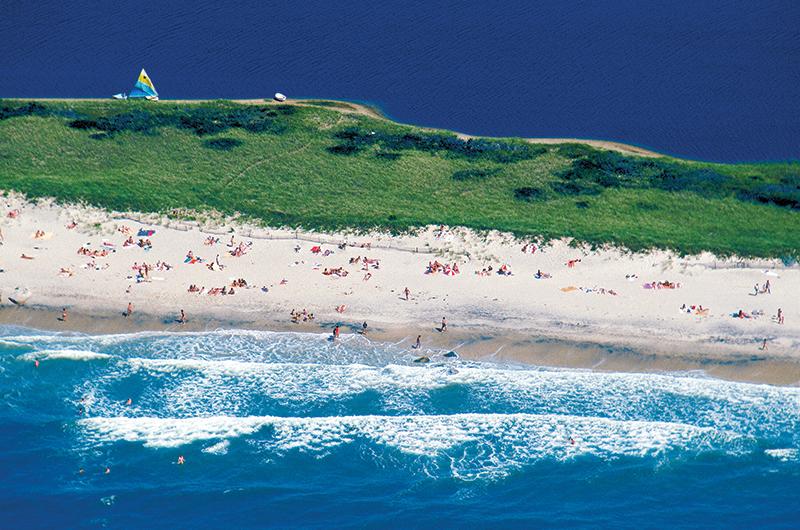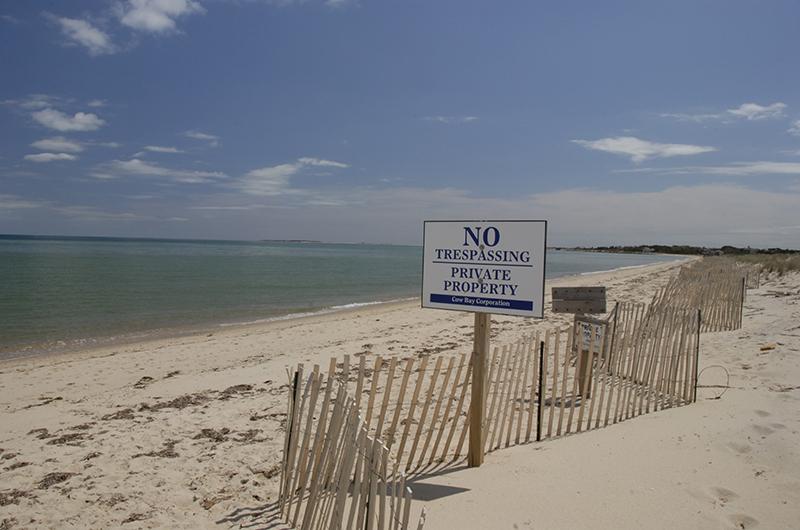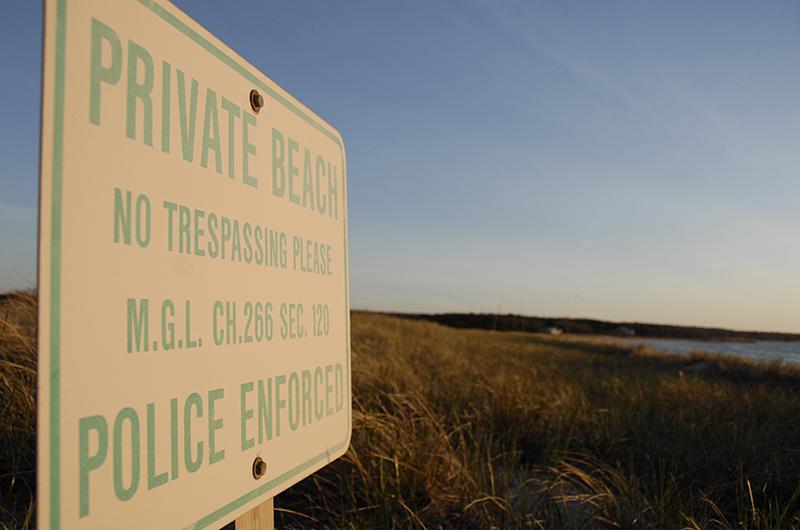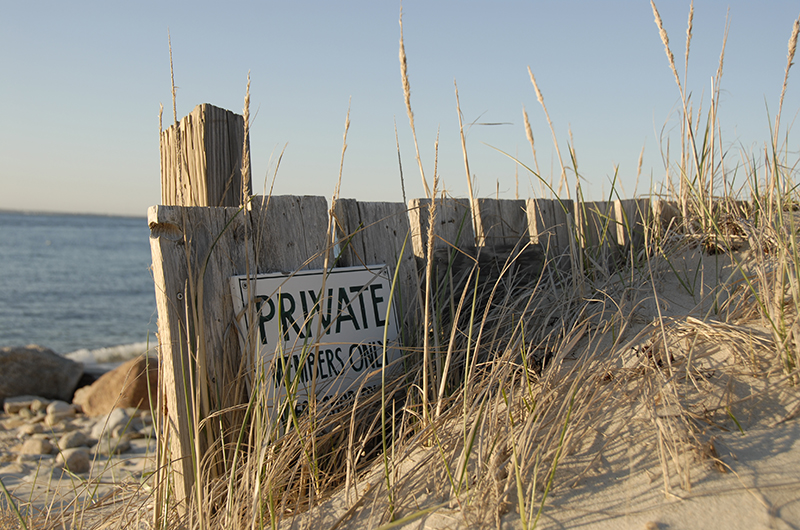Winter lingered on the night of March 24, but outside Che’s Lounge in Vineyard Haven, people stood in the rain waiting for someone else to leave so they could squeeze in. It was a big crowd for an event in the depths of the off-season on Martha’s Vineyard.
The attraction was a poetry “slam,” a competitive literary event in which poets were allocated strict time limits to recite their verse before a randomly selected panel of audience members, who then scored those performances to determine a winner.
Contestants rapped and railed and made deep personal revelations. They alluded somberly to global crises. They generally angsted artfully. Some were actually very good, but it would be fair to say that by the time Dan Waters stood up, things were in need of some leavening.
He duly provided it with a piece, specially written for the occasion and cunningly tailored for his audience of year-round residents of Martha’s Vineyard, called Dream Vacation. It was a savage, satirical, scatological, hootingly funny riff on relations between year-rounders and summer Island residents.
Here are a few sample lines:
Wait! Did you hear that?
That was the sound of something
being not discussed.
We’re famous for it.
That’s why you don’t hear a peep
when the beach we walked all winter
is the beach we get kicked off of all summer.
The audience laughed and cheered and declared Dan the winner. It was March, and in March you can laugh about these things, so long as it’s done just among a couple hundred of your closest year-round friends, in private.
And that, of course, was Dan’s point in the poem. “The theme,” says Dan, “was hush money and the fact that there are some things we’re not supposed to talk about.”
And they all relate to the odd symbiosis between those who live on-Island and the summer residents.
One of the great social attributes of the Vineyard is that this is such a discreet place. Visiting VIPs can get out and about and act like regular people, without worrying about paparazzi. They can go to Stop and Shop without an article appearing in an Island paper enumerating the contents of their basket. They can generally slob about, if they wish, like any ordinary Fred or Freda on holiday, without having their fashion sense or body shape critiqued in a gossip mag.
This is all to the good. It’s one of the big attractions of the place. Caring, sharing, non-judgmental, creed/color/gender/celebrity–neutral Martha’s Vineyard, where you don’t lock your house or honk your car horn. Egalitarian Martha’s Vineyard, where the rich residents, most of them seasonal, pay some 80 percent of the property taxes and get treated in return as if they were regular folks.

But let’s not pretend there are not resentments, foremost for many (if you discount the impact of big money on real estate prices) being beach access. For almost two-thirds of Martha’s Vineyard’s beaches are legally, if not always in practice, closed to the public. And on no subject is the influence of hush money more apparent.
“I’m warning you in advance,” said Dan Waters when I rang him to say I was doing a story on beach access, and to ask for a copy of his poem, “you will pay the consequences. You’re breaking that rule [of silence] by writing this article.”
No warning was necessary. I already had experience of how those fortunate enough to own a piece of Martha’s Vineyard’s beautiful shoreline react to people asking questions. I had rung a member of one of the private beach associations, who refused to talk about it. But she did give me the name and number of the secretary of the association.
The secretary’s response was blunt. “If she’s not talking about it, nor am I.” And the phone was slammed down.
However, it’s not just the owners of the private beaches who won’t talk. Town administrators, business owners, ordinary citizens, even the Martha’s Vineyard Land Bank – whose purpose is to acquire more land for public access – are reluctant to say anything on the record. Many don’t want to bite the hand that feeds them. Others have found ways around the access problem to which they don’t want to draw attention.
But before we get to that, a little history about private beaches. It all goes back to colonial times. A 1647 law, intended to encourage property owners to invest in wharves and boat yards, gave them ownership of beaches adjoining their land. Not just to the dune line or even to the high-water mark, but to the low-water mark, or to any tidally exposed land out to 1,650 feet beyond the high-tide mark.
This is almost a unique situation. The only other state in the country with a similar law is Maine. Everywhere else, anyone can wander as they will along the intertidal zone (although in other places there are issues about how people can get to that wet-sand area without crossing private land, but that’s beside the point of this article).
The private-beach law has been contentious ever since, it seems, people decided bathing in the sea was quite fun. And there is no question most Islanders – indeed, most residents in the state – think it appalling. Except, of course, those who have access to a private beach. Like babies and monopolies, private beaches seem dreadful things until you have one of your own.
A document produced some years ago by the state attorney general’s office, purporting to explain the intricacies of the archaic and arcane law, served only to highlight the ludicrous situation. It noted, for example, that there had been considerable argument over the years as to what constituted low-tide mark. Was it the “mean low-tide line,” that is, the average of all low tides, or the “mean extreme low-tide line” – the average of extreme low tides – “resulting from usual causes and conditions”? Apparently it was the former.
And then there were the caveats to the original 1647 law, which allowed one to traverse private beaches between high- and low-water marks if one was engaged in fishing, fowling, or navigation.
“Court cases have . . . held that the reserved public rights include the ‘natural derivatives’ of these uses,” said the AG’s primer. That included shellfishing under fishing, bird watching under fowling, and swimming and surfing under navigation. Over the years, smarties aware of these loopholes have sought to exploit them by, for example, carrying a fishing line while intruding on a private beach. But the AG’s document warned against this stratagem. Carrying a fishing line in one’s pocket would render a walker on a private beach legal “only if you intended to fish.” It was unclear how something as subjective as intent could reasonably be determined. In any case, it’s pretty pointless trying to argue the legal technicalities relating to mean low-water mark, or your fishing line or binoculars or surfboard, with a summer beach guard.

One person who can attest to this is Kim Rosen, an attorney in Northampton and a seasonal visitor to the Island for forty-five years. Last summer, at low tide one day, he went paddling barefoot along the shore near Lucy Vincent Beach. “I walked below mean low from Lucy Vincent down past some private property at the end of the town beach. The guards stopped me and told me I couldn’t do that. I said I could, and told them why.”
His explanation of the law cut no ice with the guards. The police were called, and he was kicked off the beach. He still would like to know why town-
employed guards took it upon themselves to guard the property rights of private owners. The incident also reflects poorly on law enforcement, for the action taken admits only two explanations. Either the authorities were ignorant of the law, or they ignored it. In any case, Kim Rosen was not charged with anything, but was left in no doubt he should watch his splashing step.
One of the most delightful stories about private beach access concerns former President of the Massachusetts Senate William Bulger, who took it upon himself almost thirty years ago to change the law, after having himself been ousted from a private beach. For fifteen years, from 1976, he filed bills annually, simply trying to get walking – not sunbathing or picnicking or nude frolicking, just walking – added to the list of things people could do. In 1991, he finally succeeded; the law was changed to give the public the general right to walk along wet sand areas between dawn and dusk.
But it was a quixotic victory. The state Supreme Judicial Court quickly determined property owners would have to be compensated for the loss of market value incurred by having the hoi polloi on their property. Bulger replied with another piece of legislation, requiring the Department of Environmental Management to select a piece of property to be taken by eminent domain, as a test case. Nothing ever happened. Bulger later declared the whole saga the biggest disappointment of his political career.
But as one prominent Island lawyer explained to us (anonymously, of course; he had clients to consider), Bulger’s plan was bound to fail.
“If you are going to take away people’s private property, conferring some public use, there has to be compensation for that. That’s what eminent domain is about. You can’t broaden the definition of what are permissible uses without compensation,” he said. “Then you have to work out, if the public could walk across your private stretch of beach, how much would that diminish the value of your property. It would be prohibitive, because you are taking away some of the most valuable property around.”
With sad finality, the lawyer said, “It will never happen, not in our lifetimes.”
Indeed. Open any real estate guide and see the price of beachfront land on the Vineyard. No one appears ever to have tried to make even a rough estimate of the total worth of private beach access. But consider this: According to 2005 Martha’s Vineyard Commission figures, 124,565 linear feet, or 37.5 percent, of the Island’s shoreline is open to all. The remaining 62.5 percent is either restricted town beach – 4,090 linear feet, or 1.2 percent – or land held privately in one way or another. The greater portion of this is held by individual big landowners. The rest is held by beach associations, shares in which trade for astonishing sums.
Black Point, Quansoo, and Hancock, three prime up-Island beaches, are sold in narrow strips, with a common parking lot. Although these strips are individually shown on assessors’ maps, most owners probably never know where those individual pieces are located, although it is possible, at considerable survey expense, to locate your bit.
Thus, when you buy in, you get notional title to a skinny bit of land running roughly at right angles to the ocean, but what you get in reality is the right to use the whole beach. Keys have traded for more than $400,000.
If one wanted to engage in an activity as pointless as former Senate President Bulger’s, one could multiply the price paid for a one-seventy-seventh share of one mile of Quansoo Beach – $415,000 in June 2005 – by the total amount of private beach on the Vineyard, and get a total value of beach access. One would get a figure of some $10.8 billion. That’s a ridiculously imprecise figure, of course, meaningless except as a general indicator of why a lot of people want to keep their private beaches private.
“If you bought a beach key as an investment you’d be doing spectacularly well,” said our lawyer, “considering that twenty-five years ago they probably cost $5,000, and now they’re worth $350,000 plus.”
But in fairness, many beach-key holders did not buy them for that. For many people, longtime residents or seasonal visitors, their attachment is neither mercenary nor elitist, but historical and emotional, and they would never dream of selling it.
“Heavens, no,” says one woman whose family has held a key for decades, and who agreed to speak on condition of anonymity. “At least in my family, this is like a gift . . . this mystical thing, a precious spot.”
She explains, “In our instance, it’s more like a club, and the members are given a key. The beach is owned by a group of trustees. There are a hundred families, there are rules, and there are dues. My understanding is that it started out as a gentleman’s fishing club and used to have piers that went out into the water and they would go for striped bass.
“I still don’t know what the actual [ownership] arrangement is. But they decided the area could be made available to a limited number of people. It’s always been sort of a family thing; three generations, a caravan of grandparents, kids, parents, aunts, and uncles.”
In short, this is not privilege based on wealth, but tradition based on long attachment to place. One might envy such people their good fortune, but it’s hard to resent them.
Likewise, there are some who consider their ownership as stewardship, and who eventually pass their holdings on to the greater public. In March, a couple of longtime seasonal residents sold property to the Land Bank.
One, former U.S. Attorney General Nicholas Katzenbach, was reported at the time as saying: “I believe in public beaches. Not everybody does, but I do.” The other seller, Diana Reische, said if she were making the rules for Massachusetts, “I would say that all the beaches have to be open.”
Such people are a minority, but a welcome one for James Lengyel of the Land Bank, whose mission is to buy land, particularly waterfront land, for public use. “In 50 percent of cases, we have people who deliberately set out to give the Land Bank a good price,” he says. “The other 50 say it’s market or nothing and we take that too.”

Some people, though, guard their beach rights doggedly. In 1998, Vineyard house painter Franz Guest paddled his kayak across Chilmark Pond, landed, tied it up, and went for a walk across several private beaches and a restricted town beach. He encountered actor Jim Belushi, and an altercation ensued. Belushi filed criminal trespass charges. The case ended in a very Vineyard way – a jury of six Islanders found Guest not guilty in April 1999, and there was minimal publicity on-Island.
It’s all about the hush money again, or perhaps more correctly in the case of year-round Islanders, hush access. For nine months of the year, Vineyarders have access to most of the Island. It may not be strictly legal, but most of the wealthy landowners are away and don’t know who’s walking on their beaches. In-season, lots of people know people who have access rights. And then there is the matter of town beaches, which are sort of private in that they are open to certain residents.
They work in different ways. A couple of examples are Lambert’s Cove Beach, which is owned by the town of West Tisbury and is restricted to town residents during the high season, and Lucy Vincent Beach in Chilmark, which is similarly restricted, although the town does not own it, rather leases it from a number of landowners. The situation in Aquinnah is a subtle variation on the same theme, which we’ll get to later.
The point is that if you live in those up-Island towns, you have access to beaches which are in one way or another restricted. You’d look a little hypocritical complaining about the privileged access of the rich summer folks, if you too have a degree of privileged access. And even if you don’t really agree with the status quo, you probably won’t want to risk alienating friends who enjoy their privilege. And even if you come from one of the towns with generous public beach space, the pressure to keep you silent is considerable.
Dan Waters is now a resident of West Tisbury – in fact is poet laureate of that town – but more than twenty years ago, when he was an Oak Bluffs resident, he wrote for the Gazette what he thought was some relatively innocuous doggerel about summer residents. “It was just these four lines, one of my usual fillers, and I was being a little more of a wise ass than usual,” he says. It went:
When winter comes
we sit around our KeroSuns [a type of heater]
and tell each other funny jokes
about the awful summer folks.
“This was in wintertime and somebody wrote back saying, ‘How dare you?’ I refused to apologize for it, but I ended up having to respond to this person who was just so upset. It’s been like this forever. If you open your mouth once in the letters to the editor, you will get chopped down by a bunch of summer people saying, ‘We pay your salaries, and we come here to enjoy one week of the Island, and you should be grateful.’
“If you run a business or you are a high-profile person of any kind, you know better than to stick your head above the parapet, or it will get shot off,” he says. “What I mean about hush money is it’s implicit, not explicit. You don’t want to bite the hand that feeds you.”
And it’s not just implicit threats that help maintain the Island omerta. It can also be inducements. Says Dan: “If you complain enough about not being able to go to the beach in Chilmark, and you live in Oak Bluffs, eventually somebody is going to say, ‘Look, just shut up and I’ll give you my beach pass, okay?’
“You get paid off. But that doesn’t mean everybody in Oak Bluffs can go.”
Still, there are some who won’t be quiet. The current leader of the resistance is a guy from Oak Bluffs (of course), who over recent months has been placing little “end beach apartheid” ads in The Martha’s Vineyard Times, and writing letters to the editor about the beach situation. His name is Erik Albert, and he owns the Oak Bluffs Inn.
“I’ve always thought it was wrong you can’t walk around this Island,” he says.
But he’s not stupid and knows there’s little chance of doing anything about greater access to the truly private beaches. So he and his supporters are concentrating instead on opening up the town beaches. In some cases, this just means getting the word out to people about beaches that are open. Philbin Beach in Aquinnah, for example, was thought by Erik and many others to be a closed town beach. It is not. It’s an open beach with a town parking lot.
Jeff Burgoyne, the Aquinnah town administrator, confirms that anyone may use the beach in season, so long as they don’t park there without a town permit. Even better, at the time of writing, the town is talking to the Vineyard Transit Authority about getting the bus to stop at both Philbin and Moshup beaches, “to make the town a bit more visitor friendly.”
In another case, Erik is planning more direct action. He and other members of what he calls the free beaches “movement” are currently campaigning to force West Tisbury to open up Lambert’s Cove Beach. They are encouraged in their ambitions by a court case of a few years back involving Greenwich Point Beach in Connecticut, which is closed to all but town residents.
It began in 1995, when one Brendan Leydon filed suit after being denied access to the beach. The case went three rounds, ultimately ending up before the state supreme court, which held that the town ordinance was unenforceable and that Leydon and others should have access, because it was their right under the First Amendment of the Constitution.
Because citizens had the Constitutional right to gather and conduct activities like debating and recreation in public places and because Greenwich Point had the characteristics of a public park, including a parking lot, picnic areas, shelters, ponds, and a marina, it therefore qualified as a traditional public forum. Beach access was a matter of freedom of expression!
And so, at the time of writing, Erik and his group of self-styled “freedom riders” were planning to travel by bus, bicycle, and other means that would not involve cluttering the small Lambert’s Cove car park, to test their freedom of expression this summer.
“We’re going to walk on that one,” he says, with some bravado. “The first day it becomes a closed beach is June 25. I’m not saying we’ll be there on day one, but we’re going to go soon after. . . . I think we’ll get about thirty-five people there, law-abiding people, with kids. And lawyers, and videos.
“If they arrest us, it will make a test case; if they don’t arrest us, it will amount to a concession that they cannot legally stop anyone using the town beach,” he says.
Even if the planned summer of civil disobedience on Lambert’s Cove Beach succeeds, of course, it will add only a tiny fraction to the proportion of beaches open to the public.
When it comes to the bigger question of access to all those miles of private beach, the only real agent of egalitarianism is Mother Nature. The Vineyard is a very temporary land form. The Island’s coast is eroding fast – more than ten feet per year at some points on the south shore – and sea level is rising due to global warming. Those who cannot afford to buy their own beach access may at least derive some sense of schadenfreude from the knowledge that those who can are gradually losing their assets to the sea.





